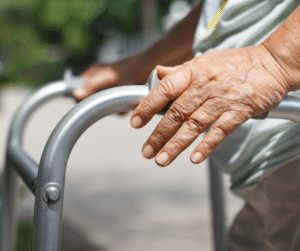Helping Seniors Adapt to a Walker After a Hospital Stay
 Seniors may find it difficult to adjust from hospital care to their homes, particularly if walkers or other mobility assistance are required. Though adjusting to walkers might be challenging, they offer the necessary stability and support. Seniors who use walkers as part of their post-hospital care plan can benefit from the information offered below.
Seniors may find it difficult to adjust from hospital care to their homes, particularly if walkers or other mobility assistance are required. Though adjusting to walkers might be challenging, they offer the necessary stability and support. Seniors who use walkers as part of their post-hospital care plan can benefit from the information offered below.
- Recognizing the Value of a Walker: The purpose of walkers is to provide balance, stability, and support. They can lessen pain by redistributing weight, help seniors avoid falls, and give them more confidence to move around. Seniors who are aware of these advantages may be more inclined to use their walkers. It’s a good idea to start talking with them about the post-hospital care plan and if it might include using a walker prior to discharge.
- Selecting the Appropriate Walker: There are several different kinds of walkers, such as rollators, regular walkers, and walkers with two wheels. The senior’s individual needs and physical state will determine which style is best. Family members should talk with the medical team for tips on choosing the right walker and how to make sure it fits their loved one correctly and fulfills their needs.
- Take Advantage of Initial Instruction: Seniors and loved ones should take advice from a physical therapist or other healthcare specialist in the beginning to gain a better understanding of using a walker. While it might seem simple, there are valuable tips they can provide that make standing, sitting down, and walking easier. This is essential, as seniors may refuse to use the walker if it’s too frustrating.
- Gradual Practice: Seniors should start with small practice sessions under supervision. This ensures they are using the walker correctly and helps to build confidence. As they get more comfortable, gradually increase the time and distance.
- Make Home Modifications: Loved ones will need to make sure the home is walker-friendly. This means eliminating cords, clutter, and loose carpets to prevent trips and falls. They should also install grab bars at strategic locations, including the bathroom, and make sure all walkways are well-lit.
- Wear Appropriate Footwear: To improve stability, seniors need to wear supportive, non-slip shoes.
- Offer Positive Reinforcement: It’s important to acknowledge and celebrate accomplishments. This will motivate seniors to continue working with the walker and give them more confidence.
- Be Patient: Using a walker isn’t as easy as it may seem. Seniors should be patient with themselves, and loved ones may need to practice patience as well.
- Use the Walker Daily: While seniors might be tempted to use furniture, counters, and other household items to get around, rather than the walker, loved ones should encourage them to include it in their regular activities. Frequent use increases familiarity and confidence, whether it is through brief outdoor walks or moving around the house.
- Follow-Up Care: As part of the post-hospital care plan, a physical therapist will likely work with the senior to ensure they’re progressing in their use of the walker and they are using it correctly.
- Monitor Progress: Family members should also pay attention to seniors’ progress and contact the medical team if issues arise or if their loved one is having difficulty using the walker for any reason.
By following these guidelines, loved ones can help seniors make the best of the situation when their post-hospital care plan calls for the use of a walker.
